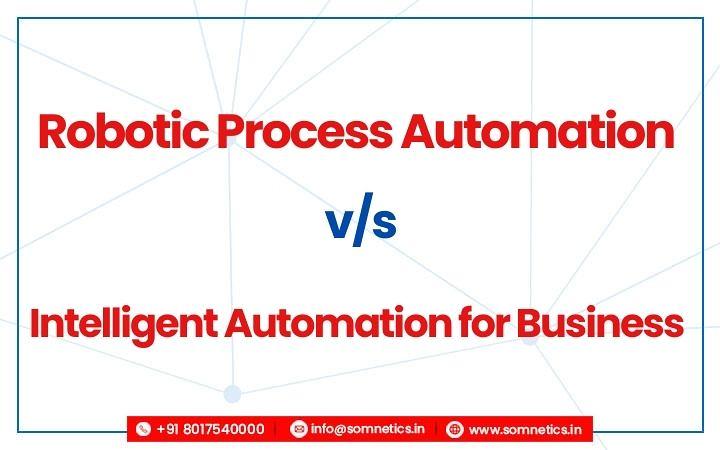
Intelligent automation and robotic process automation streamline repetitive and tedious tasks so that the employees can complete more effective and unique tasks. We will also delineate the advantages of using RPA and how it can help your business.
Let's begin by outlining each concept separately.
Intelligent Automation: What is It?
Intelligent Automation (IA), also known as Intelligent Process Automation (IPA), refers to a digital operational solution. It is achieved through the incorporation of tools such as robotic process automation (RPA), artificial intelligence (AI), machine learning (ML), natural language processing (NLP) and intelligent document understanding. This technique uses robotic process automation (RPA) to automate repetitive and routine customer service tasks. IA simulates human intelligence through the use of artificial intelligence technologies. It provides the tools and techniques to complete high-level, functional tasks that require decision-making, reasoning, judgment, and analysis. This is beneficial for employees such as customer service agents. This gives them the time and energy to connect and communicate with the customers.
Some Examples of Intelligent Automation
IA ultimately saves time, and as we know, time is money. Intelligent automation gives companies the capability to focus on more important responsibilities. Let's discuss some industries that benefit from IA.
1. Healthcare Sector
Intelligent software can search through enormous quantities of structured data and recommend a remedy based on factors like medical history or symptoms. What takes many hours of time for a doctor, takes only a minute for any computer. This enables medical practitioners and other health care professionals to spend more quality time with patients. They do not spend countless hours sifting through databases of medical research.
2. Onboarding and Offboarding of Employees
Onboarding and offboarding are integral processes that require many hours of employee labor. While paperwork, training, payment processing, and obtaining resignation letters are relatively straightforward tasks, they can be tedious and time-consuming. However, with IA, these processes can be aptly performed efficiently and error-free. Employees can funnel their efforts elsewhere, leaving computers to deal with the workload.
3. Inventory Management
Inventory management can involve extensive manual processing, but businesses can now automate inventory control with artificial intelligence. Technology eliminates the burden on personnel of managing storage and logistics systems. This improves back-office operations.
What is Robotic Process Automation?
Robotic process automation (RPA) refers to applications, scripts, or software that automates the repetitive, simple tasks that are usually slow when done manually. RPA not only avoids errors, it also reduces labor costs. These robots are designed to perform specific repetitive functions, accurately and on their own. They can retrieve information, process unstructured data, process transactions, and even communicate with other digital systems.
Some Examples of RPA
There are a number of RPA use cases in several industries. They utilize automation to free up workers' time for more creative work. Below is a listing of some of the ways RPA is put to use in industries of all kinds.
1. Processing Payrolls
Payroll processing requires several manual steps to be performed each year. Thankfully, the use of RPA systems can help simplify processes such as generating pay stubs, calculating costs and deductions, organizing, and storing important information, and creating annual reports.
2. Applying for Credit Cards
Those who have to apply for credit in financial institutions typically have their applications completed by RPA technology. The software gathers information, screens the files, determines credit, and performs other verification processes, and then determines whether an applicant qualifies for a credit card.
3. Web Analytics
Marketing activities rely on the capacity to review large quantities of behavioral data online in order to better understand one's target audience. Analytic tools available for digital statistics help recognize consumer behavior. They help companies to market their services and products in a certain way. This leads to more sales, and also an enhanced customer experience.
Differences between RPA and IA
Before we discuss the major benefits of using robotic process automation, let’ s see clearly how the two concepts differ.
IA and RPA are sometimes mistaken as one another, but they are not the same. IA platforms may have RPA capabilities, but not vice versa. Robotic Process Automation (RPA) refers to technological tools and techniques that execute time-consuming tasks more efficiently than humans do. To be effective, these tasks usually need to be routine, rule-based, simple, and repetitive. IA is integrated, allowing technology to complete complex processes using artificial intelligence, reasoning, and decision-making techniques.
Thus, though it helps in simple tasks that are monotonous, RPA provides firms with some major edge.
Advantages of Robotic Process Automation
1. It is Cost Effective
With RPA, costs can be cut nearly immediately. RPA makes for reduced operating personnel and time, allowing for improved accuracy and efficiency. By automating processes, cost savings of nearly 30% can be achieved.
2. Cuts down Operational Risks
RPA helps to decrease operational risks by providing scalability, reducing errors, and increasing compliance. Automation is the key to more reliable processes and outcomes.
3. Enhanced Productivity
As repetitive, time consuming tasks are taken care of by RPA, the human labor is dedicated towards more important, creative tasks. Thus, a major perk of using RPA is also increased employee engagement that creates fulfillment in them. Consequently, customers also get better experience.
4. Increased Levels of Accuracy and Efficiency
As RPA bots can work around the clock, the accuracy levels shoot up as well. This helps your business with efficiency.
Final Words
Now that you know the major advantages that RPA provides, you maybe looking to install it. It could be a little tricky but Somnetics could guide you. Our solution is low-risk, cost effective and flexible. It would help you optimize employee output and generate rapid ROI. So reach out today for a better tomorrow!

